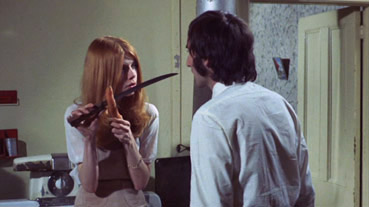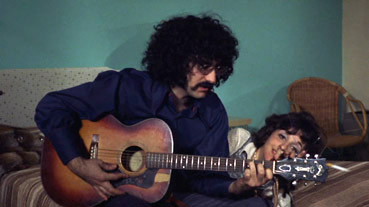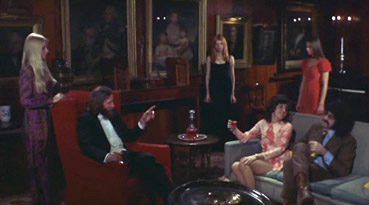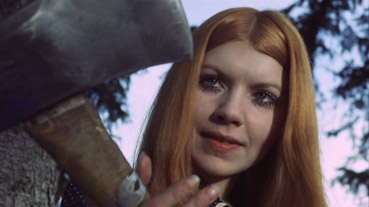"All we ever do is eat and cook!" |
Cannibal Girl Leona complains about her kitchen duties |
I like titles like Cannibal Girls, at least I do when they're attached to '70s horror cinema. There's no ambiguity about content here – these are films where the monsters are the draw and that proudly announce the fate their hapless protagonists will suffer, both to attract the genre faithful and warn off the unsympathetic. Cannibal movies were particularly good at this – you don't go to a film titled Cannibal Holocaust and expect to come out unscarred. Nowadays, though, it's a different story. A modern day movie bearing such a title will either be a naff horror remake or ninety minutes of the filmmakers relentlessly winking at the audience. Neither prospect is appetising. So I'll stick with the 1973 Cannibal Girls if it's all the same to you.
The other thing a title like this would assure us was that the girls in question would be strikingly attractive. This is, after all, exploitation cinema, and if you're going to be eaten then it might as well be by someone hot. Stop smirking at the back. In their styled-to-their-time way, these particular girls certainly fit the bill, and as played by newcomers Randall Carpenter, Bonnie Neilson and Mira Pawluk, they're also rather fun. Quite why and how this trio of young pretties became cannibals in the first place is never explained, but it probably doesn't matter. All we need to know is that they seduce young male travellers, invite them back to their farmhouse on the promise of a good time, get them into bed and chow down on them. And from an early stage it looks like the whole town is in on their little secret.

After telling temporarily stranded couple Cliff and Gloria about how these girls once lured three horny unfortunates to their doom, ageing local motel proprietor Mrs. Wainwright reveals that their farmhouse is now a restaurant run by eccentric hippy Reverend Alex St. John, a restaurant Cliff and Gloria then elect to visit. Well, they are a little peckish and the scare story is supposedly the product of folklore rather than local history, but it's still a little surprising that alarm bells don't ring when their meal is served up by the girls of the title. Of course Clifford and Gloria didn't actually watch the film's visual re-enactment of Mrs. Wainwright's story with us, so would be unlikely to recognise them. But come on – three attractive young girls serving food at the very same house where three attractive young girls apparently ate their guests. Oh, it's probably just a coincidence.
After dinner and a small fright, Cliff and Gloria settle down and share drinks and conversation with their genial host, while the girls hover in the background and sing spooky tunes. Suitably relaxed, the couple get up to leave. But after Alex makes an offhand comment about a maniac on the loose and delivers a warning that if they hear anything strange on the dark walk back to their motel they should run like the wind and not look back, they elect to accept his offer to stay the night. As Cliff and Gloria settle down to sleep, Alex and the girls start planning their next meal.
Low budget 70s horror it may be, but Cannibal Girls has something of a pedigree. It was the sophomore feature for director Ivan Reitman (he of Stripes, Ghost Busters and – oh dear lord – Kindergarten Cop) and of celebrated comedy actors Eugene Levy and Andrea Martin. It was photographed by Robert Saad, who two years later would lens Shivers for a young David Cronenberg (which Reitman produced), and it's one of the few films with the word 'cannibal' in the title that didn't end up of the BBFC's video nasties list.
It's no half-forgotten masterpiece, and a quick trip through the comments on its IMDb page will give an idea of the low regard in which it is held by some. It's not hard to see why. The humour is so dry it could blow away on a breeze, the principal photography was completed in a mere nine days, and Reitman's decision to encourage improvisation and to work from an outline rather than a completed script results in a film that sometimes ambles when you'd expect it to trot. But this also gives it a charm that I really warmed to from an early stage. As played by Levy and Martin, Cliff and Gloria are an engagingly goofy couple and the supporting cast are all distinctively sketched and played. It's probably Ronald Ulrich's turn as the Reverend Alex St. John that will prompt the biggest audience divide, a performance of camp theatricality that will prompt either appreciative smiles or groans of dismay. I thought he was great, though his comic centrepiece guide to the death house is undercut a little by Reitman's decision to focus exclusively on the objects under discussion when what I really want to watch is the actor performing his lines. And I put the emphasis on performing.

The violence is some way from strong, even by 70s standards, but that didn't stop the filmmakers (or should that be the distributor?) from adding what they creatively describe as a Warning Bell, a William Castle-esque gimmick that sounds just before someone does violence to another, followed by an all-clear chime when it's safe to peek out from behind your hands. This is even more amusing than it sounds, largely because the bell in question is actually a blaring claxon, while the all-clear chime is the sort of doorbell that used to announce the arrival of the Avon lady. Where this backfires is in exposing the fake scares before they take place – when one of the girls raises an axe over a sleeping camper and no warning hooter goes off, we know he's not going to get hurt. You'll be delighted to know that you can watch the film here with or without these comical distractions.
There's a nostalgic appeal to the atmosphere that was unique to low budget North-American horrors of the period, and if Cannibal Girls ultimately short-changes on the sex and violence promised by its poster art, it nonetheless gets by on its oddball charm, its neat central conceit, its likeable performances and the good Ronald Ulrich. The unforced, offbeat and sometimes tongue-in-cheek humour will not be to all tastes, but its hard not to warm to a film whose cannibalistic young trio make a meal for their intended victims from the meat of their unfortunate predecessors and bicker in the kitchen about how it should be prepared and cooked.
Framed 1.78:1, anamorphically enhanced and slightly windowboxed on all sides, the transfer here tends to confirm rather than belie the film's vintage and low budget. This is especially true of the opening scene, where a reasonable level of detail intermittently breaks up into rampant compression artefacts (pause the video for maximum effect – the pickaxe attack is loaded with them). Fortunately, this clears up after the opening credits, but the low budget look hangs around in the variable picture softness and the grubbiness of the darker scenes (it plays a lot darker on my computer than my TV, for some reason), sucking detail into gloom and giving colours an earthy hue, although the primes are brighter than you might expect. Although some dust spots remain, the image is largely clean, and despite a couple of minor jumps remains stable.

In keeping with the image, the mono 2.0 track is a product of its time, saddled with a narrow dynamic range and crispy dialogue trebles, but there's no major distortion or background hiss.
Cannibal Guys: Ivan Reitman & Daniel Goldberg in Conversation (26:48)
The two-man driving force behind the project (between them Reitman and Goldberg co-wrote, produced, directed and edited the film) cheerfully recall the process of funding, making and selling their second feature. It's always nice when filmmakers who've made it big look back on their early low budget work with affection rather than dismissive contempt, and that's certainly the case here – the chat is resolutely upbeat and littered with engaging anecdotes about what it was like to be young enthusiastic hopefuls trying to break into the Canadian film industry.
Meat Eugene!: Eugene Levy Talks (19:40)
Leading man and Christopher Guest mockumentary regular Eugene Levy is interviewed in a working Toronto butcher's shop by cares-about-his-image critic Richard Crouse. Crouse proves to be a fine feed man and prompts plenty of engaging and revealing memories of the shoot, the actor's approach to his character, and his work with Ivan Reitman, Dan Goldman, Andrea Martin and Ronald Ulrich. Levy is slightly more bemused than Reitman and Goldberg by the renewed interest in the film, and suggests that audience exposure to this early performance might actually not be a good thing. He still regards it as important for the relationships it helped forge and for its role in launching his film career.
French Opening Credits (3:23)
No ambiguity here – it's the apparently rare opening credits from the French release of the film in super-wobbly condition. One for the completists.

Gallery (3:31)
A rolling gallery of lobby cards, press stills, posters and video artwork, plus a review from what looks like Time Out that suggest the it's better than The Texas Chain Saw Massacre (which it bloody well isn't), all set to the sound of a raging rainstorm.
There are three Trailers (2:05, 0:59 and 0:29), soberly voiced by a gravely trailer voice man. All are rather good, but the first – the longest – is the most fun. The Warning Bell here is not the one used in the film and is actually a bell rather than a claxon. Equally enjoyable are two "super-shock" Radio Spots (0:30 and 0:60) selling the film on an AIP double bill with the appropriate sounding Raw Meat, which was actually Gary Sherman's cult 1973 London Underground horror Death Line. Trailers for other Nucleus releases are also included.
There is also an option to access PDF versions of the original American International press book and a Take One magazine interview on the making of the film, but these weren't included on the review disc.
Cannibal Girls will likely only be fully appreciated by devotees of low budget 70s horror, and even a few of those will probably not appreciate its easy-going, improvise-on-the-hoof approach. But if you do warm to the humour then it's a lot of fun, and there's a real technical assurance in Reitman's handling that tends to compensate for the visibly low budget. The transfer is OK from a less than sparkling source, but the extras are enjoyable and the option to watch the film with or without the Warning Bell still makes this the best home video version yet.
|